Disappointment
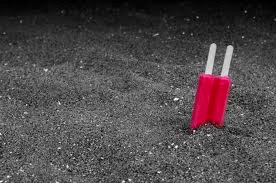
Jan Lievens: Still Life with Books (c. 1627-28)
"Maybe I was meant to f#ck that last one up!"
This world sure can disappoint. It can encourage fantastic aspirations and then fail to reward them. It asks for dreams and then seems to scheme to find ways to undermine them. It wants your best before sending its regrets. We seem somehow destined to fall short of something. Always a fly in the works and one in the ointment. What's anyone to do? We try to remain faithful to largely fallacious ideals. We believe or insist we do, even though we couldn't reason through to resolution, either. Some days, it seems we're all pretending just as hard as we can, actively ignoring the obvious facts at hand. We might not be able to afford to know or afford to understand, so we plan with studied ignorance before blaming the shortfall on happenstance. We inhabit a hyperactive Disappointment machine.
Some people seem less vulnerable, as if they are exempted from the usual consequences.
Delusion

Odilon Redon: Flower Clouds (c. 1903)
" … not even Delusion could save my bacon this time around."
It might be true that every genuinely great idea began as a Delusion. The great discoveries of science often started as no more than metaphor, awfully odd-seeming combinations of concepts as yet unproven. It might also be true that if one hopes to make valuable observations, one must increase their tolerance for Delusion. Those too married to reality rarely see anything creatively, for reality drives hard bargains. It struggles to suspend its disbelief. It relies too heavily upon the familiar. It wants to know the correct answers. Delusion, on the other hand, was never that well-grounded. It makes belief rather than relying upon certified sources. It thrives on what-ifs and speculations, deferring to make its point until after it's considered its space. It understands that even a wrong foot breaks the inertia of stuckness and that movement might be more important than initial direction.
The transition back from a decently Delusional start can prove daunting.
Defiance
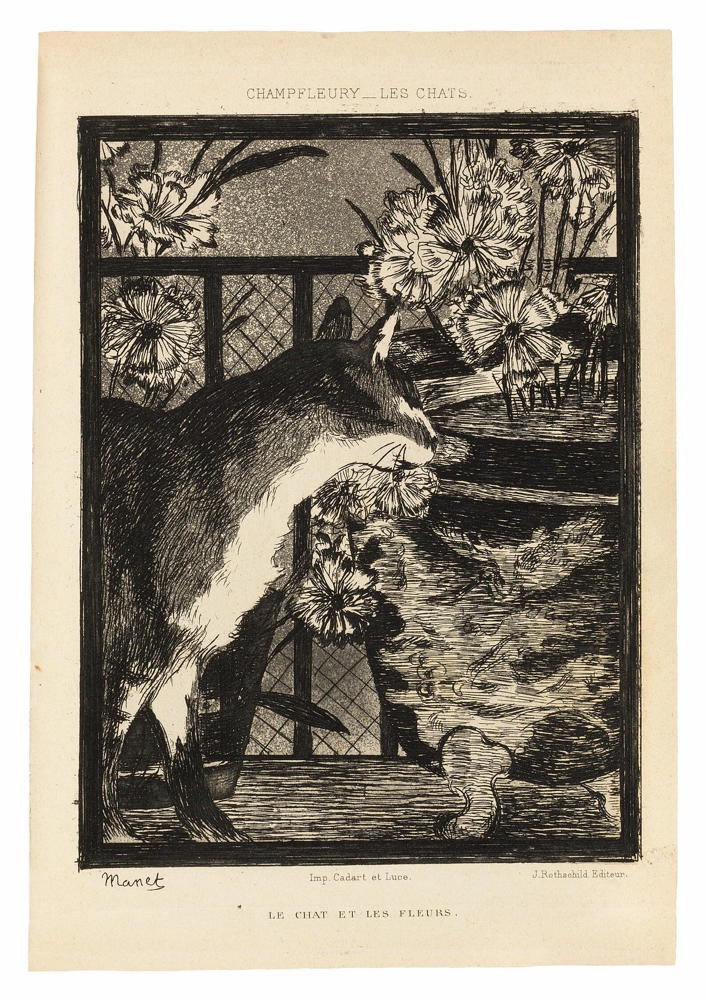
Édouard Manet: Excerpt from a book, Les Chats (1870)
published by J. Rothschild
and Libraire de la Société Botanique de France
typography by Gustave Silbermann,
printed by Cardart et Luce
Book with five etchings, two with aquatint and three with plate tone, one color lithograph, and line block prints, two with hand-coloring, with letterpress in black on ivory wove paper, with cardboard and paper cover and leather spine with gilt lettering
"May Grace grant us respite from our Defiant nature, even when we steadfastly refuse to ask for it."
Go ahead. Tell me not to do something. Refuse permission. Forbid anything. I dare you. I encourage you, for nothing better fuels my forward momentum than a decent or even an indecent Defiance. I will insist, somehow, on getting satisfaction, and I will damned well succeed. Vengence becometh mine in those moments, and I wield my very own terrible and shockingly swift sword. I might even become self-righteous, for I will feel wronged and surely—certainly— set out to somehow right that wrong, believing it my birthright. It will become a matter of honor and self-respect, and I might barter every ounce of respect anybody other than me ever invested in me, but I will succeed, even if the success kills me. Do not ever tell me, "No!"
I think people generally refuse to do what they're told.
Diligence

Cornelis Bos: Allegory:
Industry Rewarding Diligence and Punishing Indolence
(c. 1540)
" I seem to need a somewhat stiff wind in my face to find that most satisfying sort of Grace."
I think of myself as more diligent than disciplined. Diligence doesn't need discipline, for it seems to operate on distraction. I loosely focus my attention, then keep returning to the task; no or very little discipline ever required. I can certainly trudge much further than I can march and probably even further than I can stroll. I need not even know my destination to begin, on the principle that any direction, diligently followed, will ultimately guide anyone to a very different location. The difference need not matter so much as its magnitude. The mountains might not be far from my starting point, but they represent a vast difference that naturally seems like concomitant progress. Slow and steady might not win any race, but it does tend to fuel persistence, which can often outlast even the most dedicated competitor. How did I do that? One diligent inch at a freaking time!
I do not operate to any sort of grand plan.
Discipline

Will Hicock Low:
He Met Within the Murmurous Vestibule,
His Young Disciple (1885)
"Almost nothing demands more Discipline than this!"
I was up at 2 AM yesterday, wondering if I still possessed the Discipline to continue writing or if I ever truly possessed it. Discipline was never one of the more tangible possessions. It does not hang near any surface but remains hidden within time. It only ever appears over some longer duration than any instant. I've been meditating twice daily since the Spring of 1974, over fifty years. I've missed a handful of sessions over that period, but no more than the sparest handful, so it might seem beyond question that I possess Discipline, yet I still question myself. Discipline dispensed in twenty-minute increments might be insignificant and hardly seem to make any difference. I cannot assess the difference fifty years of meditating made because I neglected to include a control in the experiment. I would have needed a clone to not meditate over the same period to determine if the Discipline has made any difference.
I can say that I can sit still for any odd half hour.
Weekly Writing Summary For The Week Ending 7/25/2024

Jacques-Philippe Caresme:
Priest Making an Offering Accompanied by Nymphs and Satyrs (18th century)
Just My Sanity
I write as if my life depended upon it. It doesn't. Almost nothing's more ephemeral than the written word. Even the spoken word outlives it. Unless spoken and shared, writing sits there like a freeze-dried entree, waiting to be reconstituted by breath and tone. Writing's all alone, even if it's been distributed in several languages, even once it’s been designated a best seller. Sales don't have anything to do with it. The most widely misunderstood works in history were also among the most popular. Much can and does go awry when reconstituting an entree. The author's intent might have never been all that apparent to the author, either, so the tea leaf readers who claim to understand blow smoke. Why would any reader care about any writer's intentions? Reading was supposed to be a form of entertainment. Until and unless it's fun, it's always much better left undone. If it's not enjoyable, reading becomes a deplorable act, worse than wasting time, though time might exist solely to provide raw material for producing waste. This writer deliberately wastes his time in the hope that readers might more usefully employ theirs, reconstituting his entrees. My life does not depend upon this exchange, just my sanity.
Whelming
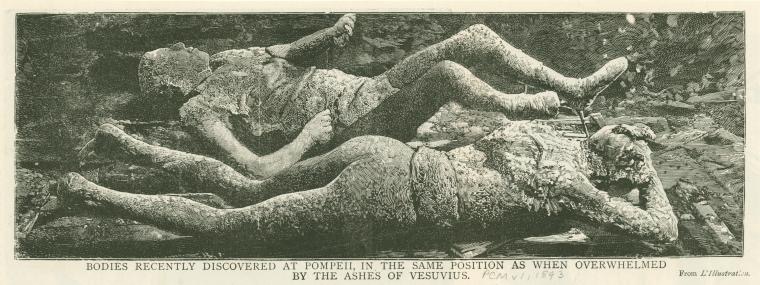
Still Image, Periodical illustration, by unknown photographer:
Bodies recently discovered at Pompeii, in the same position
as when overwhelmed by the ashes of Vesuvius (1893)
"Why would I expect anything to feel any different now?"
I might be a master at overWhelming myself and also at master at underWhelming myself as well. I hold no middle or middling ground, only extremes: swamped or parched, tossed or drowned. I might need a vacation, a break from my usual expectations since every one seems to overwhelm my coping mechanisms. I consequently feel trapped in a world beyond or beneath me, chalking up experience only as an incapable contributor. I figure nothing out. The instruction manual only complicates use. Experience further confuses rather than informs.
I'm almost certain this Whelming amounts to a self-inflicted state.
Aimlessly

Torii Kiyomitsu 鳥居清満: Man Fitting Arrow to Bow
(Edo period, 1615-1868)
"I'm hope I'll be finished by sometime next week."
I've heard it claimed that none of us know how to use the many systems we rely upon. I might use five percent of our Subaru's features. Occasionally, I'll get in trouble and have to ask The Muse to look something up in the absurdly voluminous user manual, a volume within which I cannot successfully reference anything. Even my lawn mower, broken for three weeks, remains a cipher except for the narrowest of uses when mowing lawn. The many systems on my MacBook Air remain largely vaporware, for I might employ one percent of their capacity. Whenever I attempt to do anything there, I come close to the edge of my universe. I often enough fall over into Neverland.
Just this morning, trying to capture the illustration for this story, my usual museum browser refused to find anything.
AKingsGambit
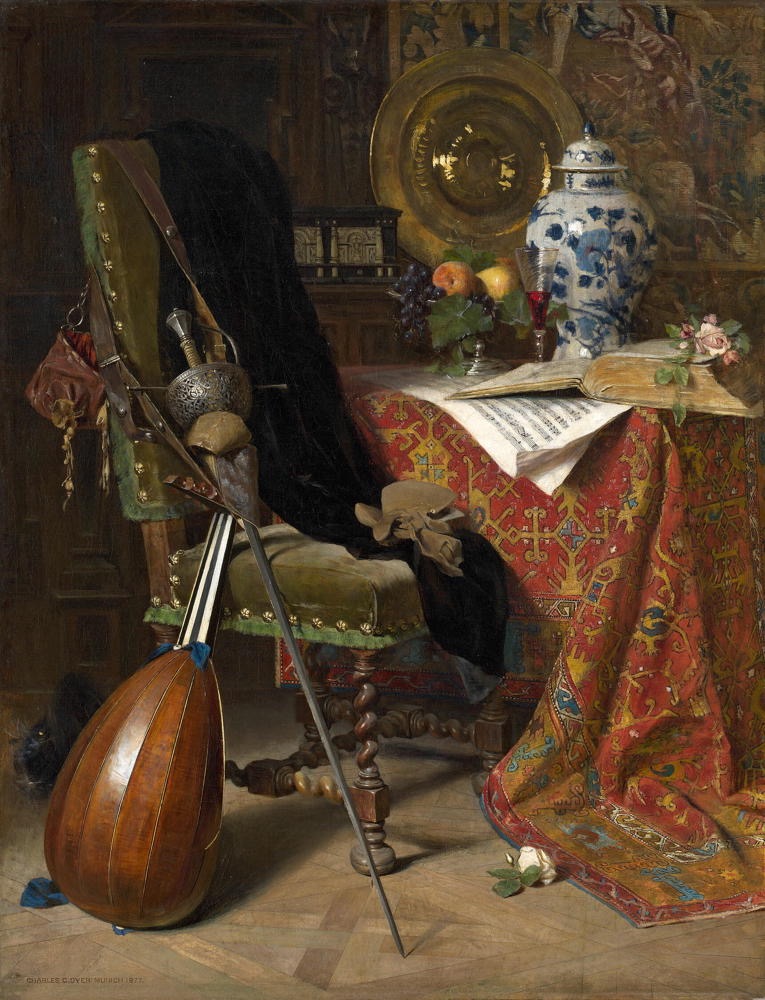
Charles Gifford Dyer: Seventeenth-Century Interior (1877)
" … positively evolving to the utter astonishment of its recently confident opposition …"
I thought the game had begun, but it had not. Preliminaries had been happening for years without an encounter, then that first one disappointed many. I didn't witness the event, having better things to do than watch some boob continue making a public fool of himself. Those who witnessed left shaken by their champion's performance even though his unworthy opponent never managed to commit a single truth. Their champion had more than competently performed the duties of his office, and nobody except his unworthy opponent and his minions had suggested that he was unfit or incapable of a second term until that single disappointing performance. Then, partisans joined the foes to insist that Joe should go. I opposed these moves. I thought them presumptuous. As with most things Presidential, the people have little understanding of anything associated with the role. I figured he'd know if Joe needed to go and act accordingly. He'd never shown any tendency to put himself above his country, unlike his unworthy opponent and, to my mind, his hankie-twisting so-called supporters.
Nobody saw it coming.
Irrelevance

Gustavs Klucis (Klutsis): The Development of Transportation:
An Important Task of the Five Year Plan, Poster, Print (1929)
"May we all experience the Grace that only achieving our own well-earned Irrelevance could ever provide."
From the earliest days of the Soviet Union, the Five Year Plan worked as a central focusing tool. It codified the aspirations of the ruling class, making them possible to describe and enforce. The government imported a small army of American engineers, each schooled in the so-called engineering science of Frederick Winslow Taylor, the self-proclaimed Father of Scientific Management. Employing techniques proposed and affected by Winslow's assistant, Henry Gantt, these engineers created plans to produce the most remarkable products. Whole industries were invented from scratch as the Soviets attempted to jump from feudalism into the modern world in a single great leap forward.
Most of these plans came to naught but the prosecution and execution of those Soviets who created them because they were naively drawn.
Travesty

William, Hogarth, Printmaker: Beer Street (1751)
"Can anybody find me an ESB, please?"
After a five-hour drive and four hours of The GrandOtter's baby shower, I felt more than ready for a couple of beers and a spot of supper. Constantly aware of my surroundings when out on the prowl, I'd spotted a place on our way over to the hotel that looked as if it might fill the bill. The Spot, a so-called Sports bar conveniently located less than a half mile from our hotel. Its website claimed that this bar had been operating continuously since the Kennedy Administration. The menu looked typical bar fare and listed that they carried a beer I rarely see anymore, an ESB or Extra Special Bitter, a common enough brew in Blighty but seldom seen in this country.
Call me old-fashioned, but I prefer my beer to taste bitter. I prefer beer with flavor.
Goner
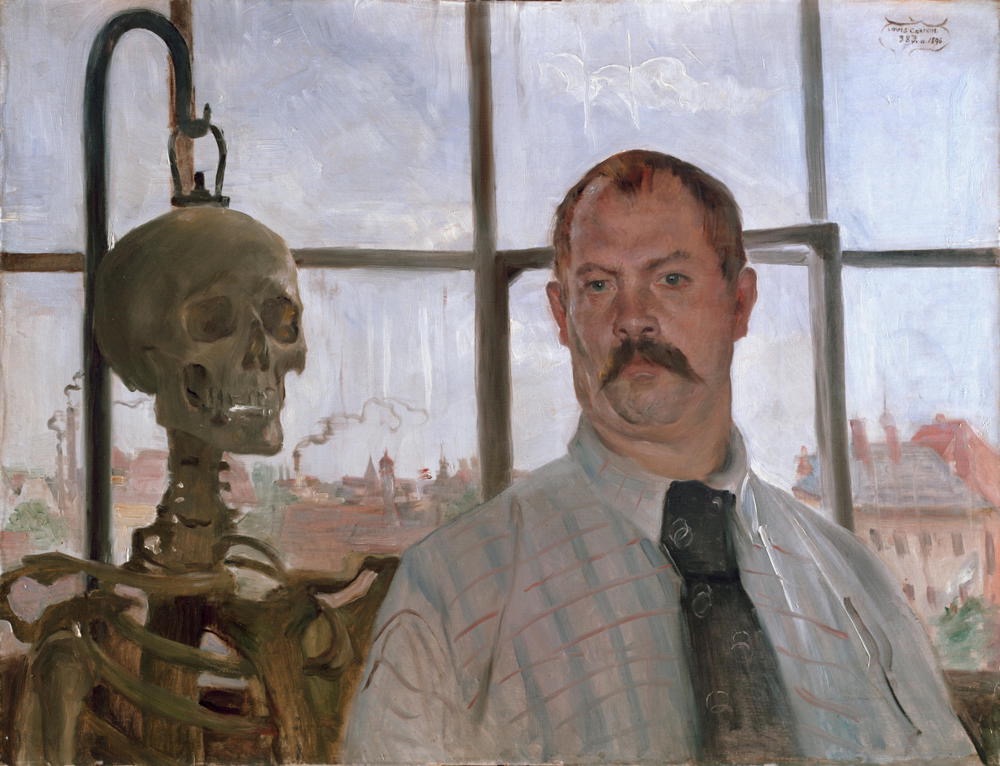
Lovis Corinth: Self-Portrait with Skeleton (1896)
"Grace visits just before such exits."
I never rise more enthusiastically than on those mornings I'm going away. My imminent absence tends to prize out my most prominent presence. I might dawdle every other morning, but these mornings, I'm focused, for I will soon be gone and unable to water the yard, incapable of performing even the least of my usual maintenance. The cats sense that something's up, and they're there fawning for an early breakfast, feigning indifference. I sense that they understand my importance to their existence, and they might doubt my dedication when they watch my taillights disappear a little too early some mornings. They know if only because we've left a window open that we will not be back to feed them supper or to provide that odd lap on-demand later.
I might rail about the need to get away for a couple of days, but I faunch at the prospect.
Weekly Writing Summary For The Week Ending 7/18/2024
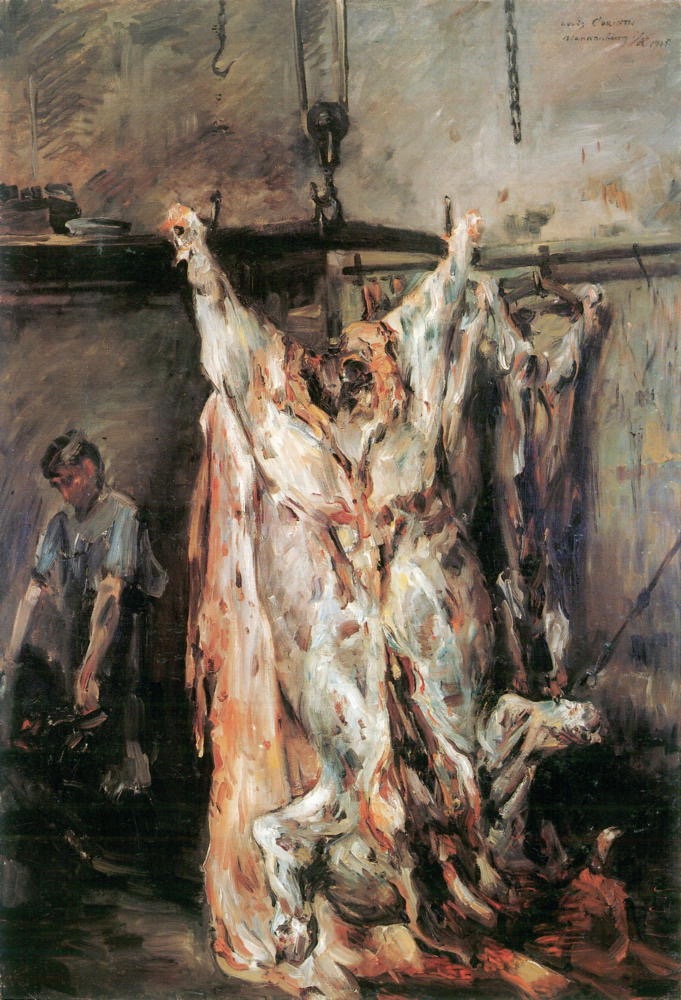
Lovis Corinth: Slaughtered Ox (1905)
Stop Clutching Their Pearls
As if this world had not grown weird enough, we now have MAGA Democrats, people so devoid of strategic integrity that they're willing to discard a winning administration for less than a handful of magic beans. They seem untroubled that they cannot name a single qualified replacement for the ticket most likely to win, all at the suggestion of a felon and the worst administrator ever to hold office. I expected the Dems to clutch their pearls and wring their hankies. Those are their traditional election-year antics. I had not anticipated that so many suddenly started believing in polls that nobody had ever believed in. Not even the pollsters believe their own polls now. We inhabit a distorted playing field whose dimensions have been obscured by the repeated torturing of traditional rules of engagement.
The opposition religiously refuses to commit a single truth as if incapable of such an act. The incumbent has consistently been underestimated. The almost unforgivable element might be the lagging self-esteem this whole defection represents. Dems have always struggled to stand by their man or woman when the going got real. Berney proved to be enough distraction that the felon was elected the first time. (Thanks, or something!) I've stopped reading my newspapers, and I'm unable to distinguish between news and propaganda. The world seems to have lost something in translation. The MAGA movement was always a scam. Anyone who felt it answered their prayers, except perhaps for billionaires, was a shill. I struggle to find an ounce of Grace in any of this shameful dance.
It has universally been the case that if I can hold my attention and continue engaging, Grace always appears. I pray that will be the case once my fellow Democrats stop clutching their pearls.
Backward

Lovis Corinth: Nude Bending Backwards (1919)
" … we've somehow managed to make some headway, anyway."
I'm entertaining the notion that I learned everything Backward. By dint of tenacious good fortune, my education hasn't managed to do me in yet, but that could happen at any moment. I suspect that everything I have accomplished would have been easier to achieve had I just started the right way around, but I didn't. I didn't even suspect another orientation could have existed; I just went about doing whatever I was doing with more or less the same information. I was never all that interested in learning.
Certainly, my manner of living will not long outlast me.
etymology

Karl Zerbe: The Face of the Big Lie (1951)
"I will feel vindicated when he loses …"
If there is such a thing with words, the usual evolution of a lie moves from the tiny to the more encompassing. Dabbling in lying tends to eventually lead to larger trouble, if only of the parody kind. A "little white lie" can successfully cordon off vast regions of authenticity from further exploration, lest what started as a small secret get inadvertently shared. Honesty became recognized as the best policy because of the exorbitant premiums charged for using its opposite.
We live downwind of a single BIG lie, one which had no clear precedent from which it grew.
BackInto
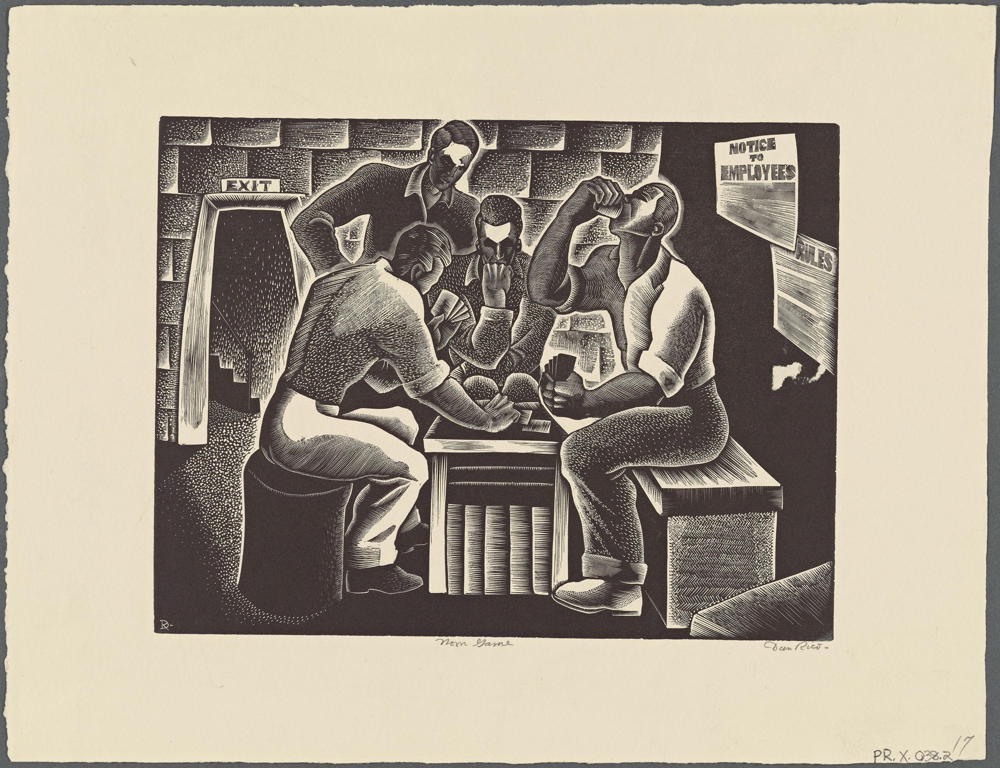
Dan Rico: Noon Game (1935 - 1943)
United States. Works Progress Administration
"My emotional crankcase drained …"
I had not remembered that ease when I'd suited up, even through the weeks leading up to the disruption. I'd undoubtedly struggled to suit up when I was down, but then I was not even pretending to enter any game. Suddenly, the act seemed more effortless than I ever remembered it seeming. I was BackInto the game again!
I feared my week's idleness might permanently eliminate my acceptance as a player.
ReEntry

Unknown Hopi carver:
Owa-nganroro [Mad Stone Eater Kachina],
(c. 1900, First Mesa, Arizona)
"Grace exclusively works in such mysterious ways."
As the Seasonal Affective Fog lifts, ReEntry emerges from the shadows. The exit had not been deliberate but mere side-effect. The resulting absence seems anything but profound. The symptoms typically linger. I'm always uncertain when to consider any bout over. I'll typically try ReEntry a tad too soon and feel rebuffed, but the sun still reliably comes up every morning, giving just as many second chances as necessary. Sometimes, I require a dozen second chances to finally find my traction. By then, I'm as thoroughly disgusted with myself as I can imagine, though should I fail at ReEntry that morning, I'll find an opportunity to better my recent record.
I am nobody's prodigal son.
Recovery

Edmond-François Aman-Jean: Reverie (c. 1900)
"The patient seems to be Recovering this morning."
With my self-diagnosis of Seasonal Affective Disorder came the emerging realization that I might already be recovering. Diseases and disorders do not just settle in and stay, not usually, not always. They pass through, first rendering us clueless about what might be ailing us or if we're even ailing. These visitors follow a progression from barely there to almost gone, leaving their benefactor or victim in some state of Recovery afterward. Recovery is where I integrate whatever that latest brush might have attempted to teach me. It's where I might freshly revel in same-old activities. It's where symptoms turn vestigial, and effects increasingly become intangible. Memories linger, though, of self-doubt and revelation, exhaustion and foreboding, and a particular haunting uncertainty. The Muse was convinced I had some bug. I believed I had lost my backbone and began slacking. Whatever the lessons, if any, I continue assimilating and integrating in Recovery.
I'm still naive enough to believe that everything probably happens for a reason and that my job primarily consists of determining underlying reasons and making some sense of them.
AintNoCure

Alphonse Marie Mucha: The Seasons (1897)
" … an infinite game perhaps intended to encourage the pursuit of happiness …"
"There Ain't No Cure For The Summertime Blues." - common folk wisdom
In the deepest and darkest days of a typical January, some notable percentage of the population will at any time suffer the effects of what's labeled Seasonal Affective Disorder (SAD). The effects tend to be mild to moderate depression, said to be caused by light deprivation. Common treatments include exposure to broad-spectrum lighting and long naps. Many escape South to become what we call Snow Birds. Some even become extremists and purchase second houses in places where the sun always shines, like Arizona and extreme Southern New Mexico, abandoning their more Northern homesteads half the time. Zealots might move to some awful place like Florida full-time to escape these effects.
There ain't no actual cure for January's Seasonal Affective Disorder, though there are treatments.
Weekly Writing Summary For The Week Ending 7/11/2024
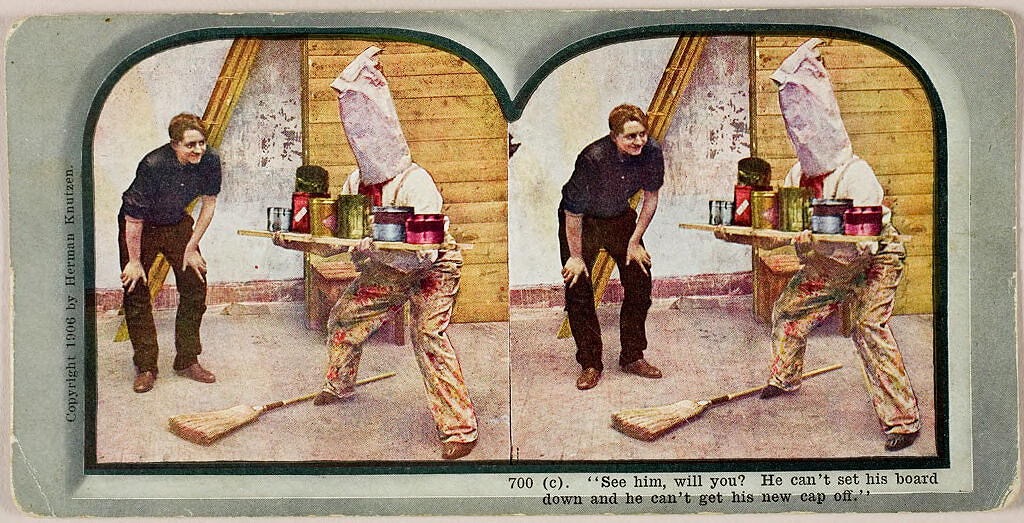
Unidentified Artist, stereoscopic photograph,
"See him, will you? He can't set his board down,
and he can't get his new cap off." (700 c), (c. 1906)
What Was Never Realistically Figure-outable
I'd thought I'd banished the notion that intelligent people were smarter and leaders could lead, but I keep finding vestiges of my initial innocent beliefs. These wound me because I long ago proved that I could not live up to such fictional expectations. In my time, I have carried the titles but have yet to fulfill the naive expectations. My smarts were balanced with at least a counterbalancing amount of stupids. My leadership required some followership, too. As I've insisted before, I was never once an island and not even a half-decent isthmus. I remain connected to much I'd long ago hoped to out-grow or divorce. Anyone who ever divorced learned that there's no such thing. It's just another fiction. I rarely manifested anybody's overly advertised ideals, or believably wrote about them. But then, nobody's likely to purchase the guide for becoming the imperfect anything. Asperation requires absolute fealty to some impossible ideal. We thrive and also die on our dichotomies.
I stand shivering at the end of another humbling writing week, appreciating your presence here and quietly wondering what's kept you coming back. I remain supremely unworthy of your presence, for I have always been mumbling here, trying to figure out what was never realistically figure-outable. Thank you for following along!
—
Weekly Writing Summary
This Grace Story reports the sorry state of my Clutter, a presence I often struggle to justify. I sometimes think I should produce better than Clutter without always recognizing the Grace it represents.
Jean-Baptiste-Siméon Chardin: The Attributes of the Arts and the Rewards Which Are Accorded Them (1766)
" … poor but honest penmanship …"
—
This Grace Story finds me happily Uncluttering after mentioning my Clutter in yesterday's story. It's funny how this universe sometimes seems to work this way. Just mentioning can start a chain of reactions that makes a real difference.
Unknown Artist: Panel of Uncut “Slip” Designs, Hemp, plain weave; embroidered with silk in tent stitches (1625-75)
—
This Grace Story finds me enjoying the only enjoyable time in the Summer Heat, the wee hours when the world feels moist.
Angelo Caroselli: Summer (c. 1620s)
"Grace appears in these most unlikely places."
—
I went to bed last night feeling every bit as incompetent as I've ever felt. This morning, it dawned on me again just how overrated competence has always been. That's the subject of this Grace Story, Competence.
Gordon W. Gahan: Star's Daughter (Eleventh -- End of Set): "I am interested in becoming a good actress, not a movie star. If I happen to become a star, too, I'd love every minute of it, of course. But my first goal is to become a competent actress."(1964-65)
"It's by the Grace of something far less than any of us that we ever manage to succeed."
—
The original version of this Grace Story was indescribably better than this one, but the original was lost to the ages after I'd gotten a little AheadOfMyself. The Universe attempted to teach me a lesson this morning about the dangers of living in lines.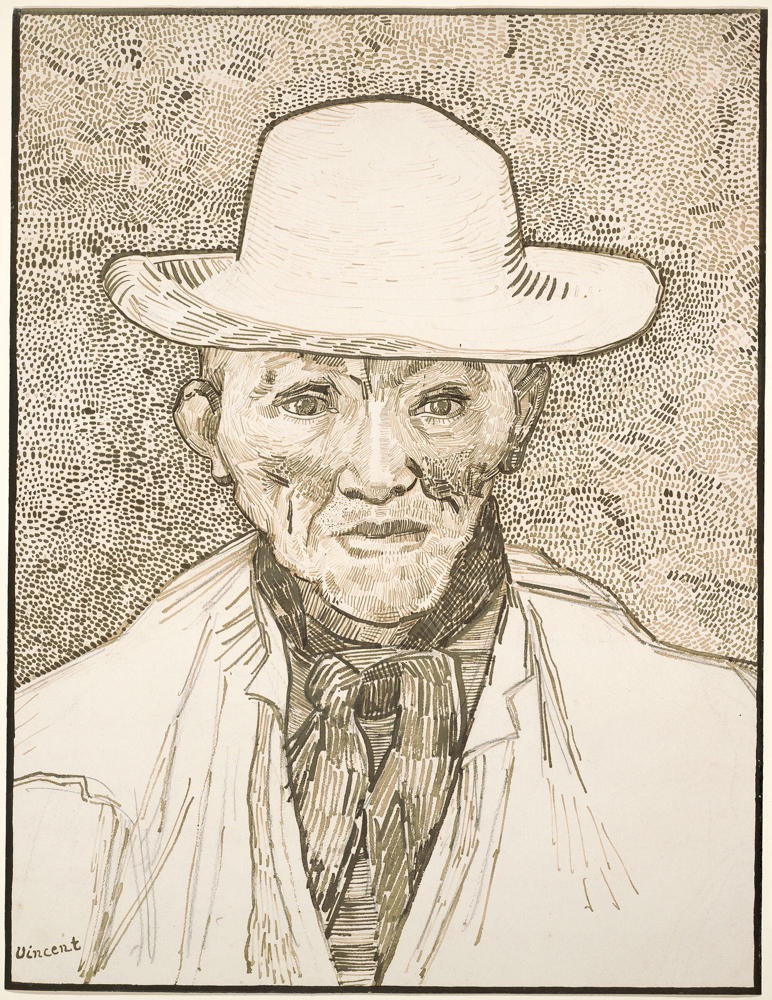
Vincent van Gogh: Paysan de la Camargue [Peasant of the Camargue, Portrait of Patience Escalier] (1888)
"We do not live in lines."
—
This Grace Story includes no Grace in it. It only implies its presence within an explanation of a True Impossible, a HaveToWantToCant.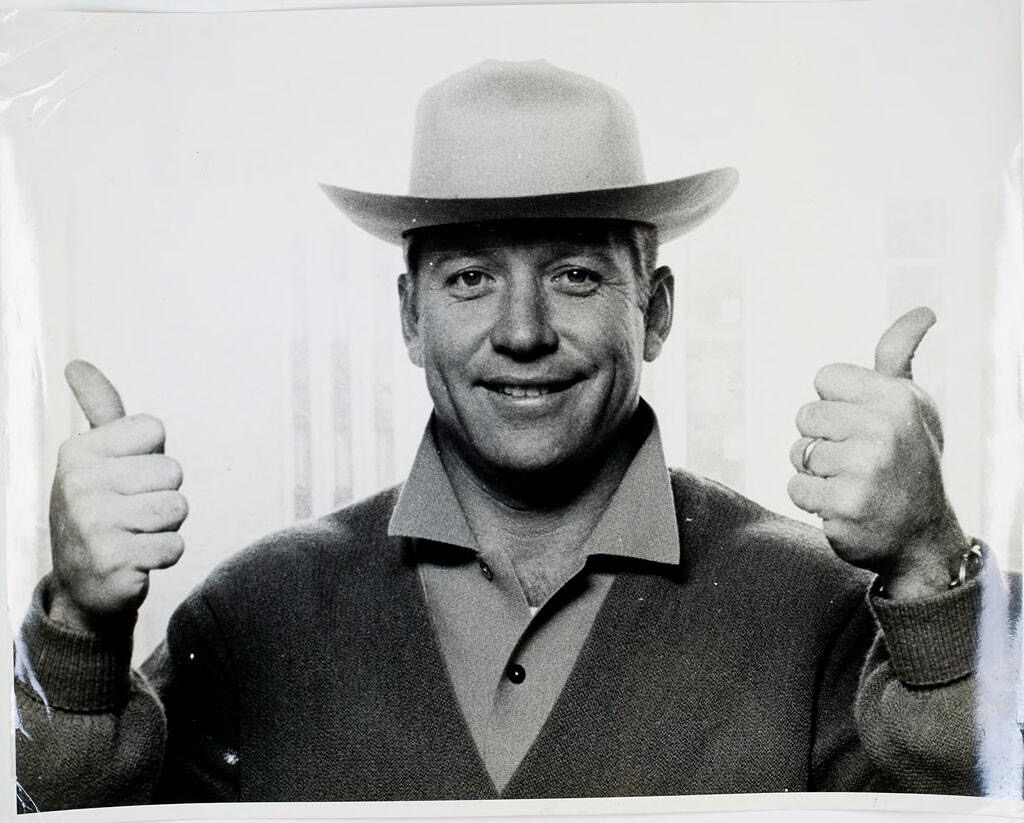
Gordon W. Gahan: Taking no notice of a troublesome right shoulder, New York Yankee star Mickey Mantle manages a "thumbs up" sign as he overlooks the Mayo Clinic from his hotel room here on January 17th. The champion slugger will undergo nearly a week of tests at the clinic to see if the shoulder can be fixed up. Before starting on the grueling series of examinations, Mantle remarked, "It isn't sore, but I can't throw with it." (January 1966)
"I must be dealing with a true impossible here."
—
I mentioned in one of my stories this week that all the possible combinations present in every fifty-two playing card deck have yet to result from all the diligent shufflings they've so-far been subjected to. It shouldn't surprise me to realize that I've barely nicked the possible configurations of a week's writings. If I can muster enough trust in the universe, a fresh perspective will emerge every morning, right on time. A few of the resulting perspectives do not honestly seem all that fresh, but each has been different enough, if not entirely different. I'd imagined that I'd eventually exhaust the possibility of posting any new material, but that has definitely not been the case. I'd thought I share that last half-decent Dad Joke and be done with this audacious experiment, but that hasn't happened yet, either. I have more than fifty-two cards in my deck. Clutter came up in the never-to-be-repeated rotation, and did its brother, Uncluttering. The Heat this Summer's delivering also made an appearance. I encountered one of my abiding incompetences in Competence before catching myself getting a little Agead Of Myself. I ended this writing week immersed in a Truly Impossible, a Want To, Have To, But Can't. One of those occasions no one ever actually rises to. Thank you for following along!
©2024 by David A. Schmaltz - all rights reserved
HaveToWantToButCant

Gordon W. Gahan: Taking no notice of a troublesome right shoulder, New York Yankee star Mickey Mantle manages a "thumbs up" sign as he overlooks the Mayo Clinic from his hotel room here on January 17th. The champion slugger will undergo nearly a week of tests at the clinic to see if the shoulder can be fixed up. Before starting on the grueling series of examinations, Mantle remarked, "It isn't sore, but I can't throw with it." (January 1966)
"I must be dealing with a true impossible here."
My senses usually keep me safe from directly experiencing many of the more terrifying realities. It's true that I'm hurling through space on a corkscrewing planet moving at 67,000 mph, or 18.5 miles per second. I sense none of this. Likewise, I hang upside down on the face of this planet while directly sensing none of that, either. My sense of the possible shares some of this blesséd blindness, for I cannot directly determine possibility, either. Much of my work emerges under Wait And See conditions. I can talk myself out of something without directly knowing just how possible it might have been to produce. More telling, I can just as easily talk myself into starting something that will later turn out to be an impossible. Knowing which it might become often proves the most impossible, for will sometimes determines way. Other times, no amount of will can translate into any feasible way. We only ever learn this later.
The run-of-the-mill Impossible might well seem eminently doable at the outset.
AheadOfMyself

Vincent van Gogh: Paysan de la Camargue [Peasant of the Camargue, Portrait of Patience Escalier] (1888)
"We do not live in lines."
I just "lost" my first hour of writing. I hadn't managed to do that in years. I'd grown careful and cautious. As one who measures my progress in captured words, I never approach my work in a cavalier fashion. I tend to be deliberate to a fault, following patterns varying little from session to session. I set up my page before setting to work, saving often, as if sighing. This morning, I must have forgotten to sigh. I inadvertently sorted my collection of stories by something other than the usual Date Created. I had not anticipated that I could have sorted them by Title instead, and there's only a tiny checkmark in the corner of the column label to indicate that the underlying list has even been sorted.
The list made no sense.
Competence

Gordon W. Gahan: Star's Daughter (Eleventh -- End of Set):
"I am interested in becoming a good actress, not a movie star.
If I happen to become a star, too,
I'd love every minute of it, of course.
But my first goal is to become a competent actress." (1964-65)
"It's by the Grace of something far less than any of us that we ever manage to succeed."
Competence has always been overrated. Most of the best that has ever been accomplished has been achieved by those who have yet to be fully qualified to produce such works. The writer, who was considered unpublishable until she squeezed out that best seller. The artist who lived in an unheated garret through most of his life and whose oeuvre now graces The Louvre. We're all of us essentially Bozos on this bus, and, for sure, always were.
It's not that we haven't tried to create effective certification programs; they're over-enrolled.
Heat

Angelo Caroselli: Summer (c. 1620s)
"Grace appears in these most unlikely places."
Summer turns merciless when July Heat arrives. Days bleach the lawn a buff-brown, and the gardens cower, praying for their morning or evening shower. The hanging pots need watering every morning, or they'll wither in the late afternoon sun. There's nothing to be done. I can work outside until noon. Then, I must flee back inside to hibernate until evening. I go effectively nocturnal, and the light seems more of a hindrance than helpful. Cold showers come back into fashion. It's not the Heat so much, but the humility of restricted latitude of movement. I daresn't go on a whim. I need a pretty darned good reason to venture out into it. It brings no discernable benefit.
They still say, "At least it's a dry heat."
Uncluttering

Unknown Artist: Panel of Uncut “Slip” Designs,
Hemp, plain weave; embroidered with silk in tent stitches (1625-75)
Sometimes, but only sometimes, naming a condition starts the process of resolving it. So it was yesterday when I called out my Clutter before, later, tucking in to clear out some of it. I spent most of my day Uncluttering. If only it were also so easy. I feel grateful that it IS sometimes just that simple.
I've long held that I have an ethical responsibility to discuss whatever's not supposed to be discussed, for undiscussables hold special powers.
Clutter

Jean-Baptiste-Siméon Chardin:
The Attributes of the Arts
and the Rewards Which Are Accorded Them (1766)
" … poor but honest penmanship …"
My desk belies my self-conception as a tidy person. Perhaps I once was neat, but an honest appraisal would conclude that I am no longer well-ordered. My desk holds the residue of innumerable works in progress, some of which I finished. I've always struggled with creating permanent records. I maintain no files, just piles that continue accumulating. To put anything "away" seems the equivalent of losing it.
With the death of a dear friend last month, I've started wondering what sort of legacy I'll leave.
Weekly Writing Summary For The Week Ending 7/04/2024

Henry Peach Robinson:
When the Day’s Work is Done,
A combination print made from six different negatives.
(1877, printed January 1890)
I Sleep Though My Julys
I dread July more than I dread the dead of Winter. Aside from the cool mornings, July days tend to turn punishingly warm. There's no escape until I turn on the sprinkler as the sun starts setting lower. The gardens exist balanced between scorched and saturated; whatever water I manage to apply early will be evaporated out by the end of most days. It's exhausting just failing to keep up. The gardens start producing, though, and the evenings, once the sun sets and the sprinkler's done its magic, compel us to eat on the back deck instead of in front of whatever's streaming. The TV's not been turned on in more than a week, and I'm not missing it. If I'm up by two, I have plenty of time to finish my writing before the sun starts to blind me. I can maintain my schedule as long as I'm out early. I hibernate most afternoons, remembering a soft blanket my mom used to spread on the living room floor before inviting me to nap through the blistering early afternoon hours. It was cool on the floor, and I could never keep my eyes open. I sleep through my Julys just like I doze through my Decembers.
Wronking

Utagawa Yoshifuji:
Five Men Doing the Work of Ten Bodies
(Gonin jushin no hataraki) 1861
"Let nobody say that I compromised and delivered anything the easy way!"
I was wrong on several levels when I assumed that work would become easier as I aged. I presumed that I would naturally become more experienced so that my prior knowledge would accumulate to the point that I might only rarely feel baffled. Almost precisely the opposite has proven true. I find myself freshly baffled with virtually every engagement, with experience proving to be lousy preparation for whatever presents itself next. Contrary to my earlier theory of ever-expanding competence, my proficiencies wain. This feels more painful than I might have imagined. After decades of living without much ego involvement, I've lately started suffering from a wounded ego, a debilitating if rarely fatal condition that nonetheless feels alarming. My best intentions sneer back at me these days.
I have heard of people who claim to enjoy learning.
RootDirectory

William Trost Richards: Tree Roots (19th-20th century)
"May the Grace of perseverance preserve my sanity in the face of this unending inanity."
I recently complained here about the new and improved Google Apps, for they seemed to have been specially designed to be unusable. Further use has led me to a deeper understanding that they were not new or improved but rely upon a now ancient design, one I had until recently managed to avoid learning. They employ the same form as MS-DOS' old hierarchical directory design, one so counter-intuitive as to seem unusable to anyone not entrained to comprehend it. I do not know how one comes to learn how to use RootDirectories and such. I know they offer few clues about navigating within and around them. I'm suddenly back to the primitive hunt-and-peck stage, often bewildered and frozen without a clue what to do next. If The Muse isn't around to advise, I stay frozen until after she returns.
The Muse is barely civil when I ask her one of my questions, for she learned about RootDirectories ages ago.
Convertible

Jack Rodden Studio: Untitled
[dignitaries riding in convertible in town parade]
(c. 1950)
"Grace even catches up to politicians when they ask nicely enough."
Political campaigns look different from the inside. Outside looking in, an observer hopefully sees mostly what the candidate wants them to see. Scenes should seem carefully choreographed, scripts thoughtfully written and practiced, and presentations more or less perfect. Inside looking out, it's continually one damned thing after another, none of which seems quite right or even right-able. The ship seems like it's taking on too much water. The campaign started too late and seems to be falling ever further behind. The difference between inside and outside states gets to grate on the campaign team. Everything takes longer, costs more, and produces less. If not careful, the candidate and team might grow despondent. Were it not for the likely fact that the opposition has it worse, the effort would hardly seem worth it.
Take, for example, the simple idea of the candidate appearing in the Pasco Fourth Of July Parade, a tradition in this legislative district.
Memorial

Jan Verkade: Memory (1893)
" … he'll forever overlook his homecoming."
No death seems complete until the survivors attend a Memorial. These affairs range from simple to elaborate, family to community. They represent much more than merely the memory of the recently departed; they embody an utterly unique slice of the departed's community. We trivially insist that everyone's essential and nobody exists as an island, but few ever suspect the depth and breadth of anyone's circle until after that center departs. Then, it's as if the central point of orientation has left the building. Even those otherwise related to each other seem somewhat worse for the absence without that one additional degree of connection. For instance, I could have sworn my friend Gary lived as a virtual hermit these past few years, but legions showed up for his Memorial picnic, catered with a massive hauled-in barbeque rig and a separate chuckwagon bar.
I came with my requisite pocketful of words.


